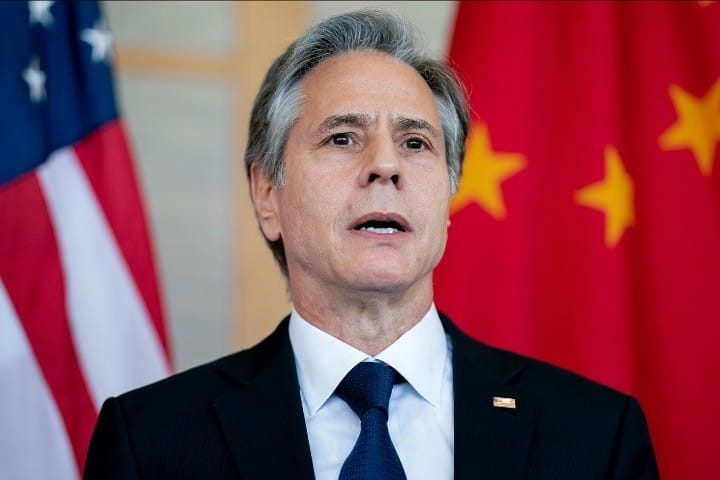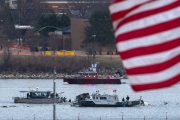
SINGAPORE — The Biden administration announced that it would postpone Secretary of State Antony Blinken’s impending visit to Beijing after a Chinese surveillance balloon was discovered hovering at high altitude over sensitive nuclear locations in the United States, Bloomberg reported on Friday.
Blinken was poised to have talks in Beijing this week in the first such visit by a top U.S. diplomat in five years.
However, the spotting of the balloon caused officials to conclude that visiting China immediately after would give a wrong message to the world, based on sources familiar with the matter who wished to remain anonymous.
China took atypical placating measures to alleviate the tension over the incident, with the Foreign Ministry admitting it was “regretful” that a “civilian airship” entered U.S. airspace owing to unexpected reasons. It claimed the balloon was doing climate research.
The balloon was first discovered early last week hovering over Montana, the location of intercontinental ballistic missile silos, a senior Defense Department official said last Wednesday. The official declared that the balloon did not seem to threaten national security and that it was not the first time such an incident like this has occurred.
The Pentagon’s announcement about the balloon led to a furor from Republican lawmakers, with Representative Mike Gallagher (R-Wis.), chairman of a new House committee to investigate the Chinese threat, saying that the balloon “makes clear that the CCP’s recent diplomatic overtures do not represent a substantive change in policy,” alluding to the Chinese Communist Party.
Chinese Foreign Ministry spokesman Mao Ning warned the U.S. against “hyping” the incident. “We have no intention to violate other countries’ sovereignty and airspace,” Mao told a briefing, elaborating that she hoped “the relevant parties will handle the matter in a cool-headed way.”
The ministry later released a statement claiming the balloon is an “airship” that is flying over the U.S. for civilian research purposes, and expressed regret that it trespassed into U.S. airspace.
“The airship is from China and is civilian in nature, used for meteorological and other scientific research. Due to the influence of westerly winds and its limited control capability, the airship deviated from its intended course,” the statement said.
“China regrets that the airship strayed into the United States by mistake due to force majeure. China will continue to maintain communication with the U.S. side to properly handle this accident.”
For the Biden administration, Blinken’s planned visit was part of an attempt to prevent the U.S.-China rivalry from exacerbating. For leaders in Beijing, it was meant to show China’s emergence from Covid-19 and its wish to reconnect with the rest of the world.
U.S. officials refused to answer several questions about the balloon, including the exact target of its surveillance, its size, or other details.
“It is currently traveling at an altitude well above commercial air traffic and does not present a military or physical threat to people on the ground,” Brigadier General Pat Ryder, a Pentagon spokesman, told reporters.
The incident brings to mind the extent to which Beijing and Washington are willing to conduct espionage amid increasing tensions between the superpowers.
Hours after the U.S. announcement, Canada declared it was cooperating with Washington to track the balloon, and that it was keeping an eye out for a “potential second incident.”
“Canadians are safe and Canada is taking steps to ensure the security of its airspace, including the monitoring of a potential second incident,” Canada’s Defense Department said.
U.S. Senator Marco Rubio (R-Fla.), the top Republican on the Senate Intelligence Committee, said the spy balloon was concerning but not totally unexpected. “The level of espionage aimed at our country by Beijing has grown dramatically more intense and brazen over the last five years,” Rubio said on Twitter. His fellow Republican, Sen. Tom Cotton of Arkansas, had urged Blinken to cancel his trip.
Republican House Speaker Kevin McCarthy (Calif.) said he would call for a “Gang of Eight” briefing, alluding to a classified national security briefing for congressional leaders and Republican and Democratic leaders of the intelligence committees.
The Biden administration briefed Gang of Eight staff last Thursday and gave additional briefings, a U.S. official said.
Relations between China and the United States have plummeted in recent years, especially after then-House Speaker Nancy Pelosi’s (D-Calif.) controversial visit to Taiwan last August, which led to pugilistic Chinese military drills near the self-ruled island.
The airport in Billings, Montana, issued a ground stop as the military deployed assets including F-22 fighter jets in case Biden ordered the balloon be shot down. “We wanted to make sure we were coordinating with the civil authorities to empty out the airspace around that potential area,” an official said. “But even with those protective measures taken, it was the judgment of our military commanders that we did not drive the risk down low enough. So we did not take the shot.”
The official said the balloon’s flight path would have carried it over a number of sensitive sites, but did not elaborate. Malmstrom Air Force Base in Montana contains 150 intercontinental ballistic missile silos.
Officials refused to say how high the balloon was flying but admitted that it was operating above civilian air traffic and below “outer space.”
Such balloons usually between 80,000 feet and 120,000 feet, well above where commercial air traffic flies. The highest-performing fighter aircraft usually do not operate above 65,000 feet, although spy planes such as the U-2 have a service ceiling of 80,000 feet or more.
Craig Singleton, a China specialist at the Foundation for Defense of Democracies, said that such balloons had been broadly used by the U.S. and Soviet Union during the Cold War and are a low-cost intelligence-gathering method.
Spy balloons have flown over the U.S. several times in recent years, but this one seemed to be hovering longer than before, an official said.
Security analyst Alexander Neill said that although the balloon was likely to be a fresh thorn in the flesh of China-U.S. ties, it was probably of limited intelligence value compared with other elements that China’s state-of-the-art military can obtain readily. “China has its own constellation of spy and military satellites that are far more important and effective in terms of watching the U.S., so I think it is a fair assumption that the intelligence gain is not huge,” said Neill, who is an adjunct fellow at Hawaii’s Pacific Forum think tank.



